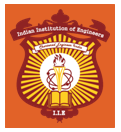THE ACADEMIC PROGRAMME OF THE INSTITUTION MAINLY CONSISTS OF SECTIONS ‘A & B’ EXAMINATIONS, POPULARLY KNOWN AS THE AMIIE EXAMINATION.
DIPIIE in MATERIAL ENGINEERING
Information For:
- Home
- Examination
- R&D
- Application Status
- Apply Membership Online
- RTI Information & Reply
- Awards
- Become Student's Chapter
- Online Verification
- Placement Service
- Alumni Association
- Approval & Recognition
- AMIIE(B.Tech./B.E.)
- DIPIIE-DMIIE-TMIIE(Diploma)
- List of Student's Chapter
- Our Vision
- Circular/Notice/Tender
- Hall Ticket
- Examination Result
- Vacancy & Career
- Global Linkage
- Downloads
Key Highlights of the AMIIE
- Project based learning through industry collaborations.
- Focus on skill building & practical implementations.
- Interactive sessions with industry experts through Student's Chapter.
About
Materials engineers are responsible for the research, specification, design and development of materials to advance technologies and products of many kinds.
Their expertise lies in understanding the properties and behaviors of different substances, from raw materials to finished products. The field is also referred to as materials science or materials technology.
Career
Career prospects are generally good within this branch of engineering. Due to there being so many different specialist areas and such rapid technological change in the field, there is a consistent demand for materials engineers.
Once you have built up experience, it is possible to move into general management roles (within laboratories or in the wider organisation) or to develop a technical specialist area.
Progression to management will depend on the size and scope of the employing company; for example, a small but highly specialist biomedical laboratory cannot offer the management career potential available within a global oil and gas company.
You are likely to play a significant role in finding more energy-efficient and less polluting and waste-generating, products and processes. This particular aspect of the role may further increase promotion prospects within many organisations.
You can focus your career in a particular direction depending on your interests. For example, you could decide to be based in the laboratory working on research and development, or you may want to concentrate on the production and processing side.
With significant experience you could set up your own consultancy or small specialist practice, or you could find work as a contractor for various different organisations and projects.
Job Prospects
Exact tasks vary according to the industry, the specific material you work with and the size of the organisation you work for, but there are a number of activities common to most posts. These include:
- selecting the best combination of materials for specific purposes;
- testing materials to assess how resistant they are to heat, corrosion or chemical attack;
- analyzing data using computer modelling software;
- assessing materials for specific qualities (such as electrical conductivity, durability, renewability);
- developing prototypes;
- considering the implications for waste and other environmental pollution issues of any product or process;
- advising on the adaptability of a plant to new processes and materials;
- working to solve problems arising during the manufacturing process or with the finished product, such as those caused by daily wear and tear or a change of environment;
- supervising quality control throughout the construction and production process;
- monitoring plant conditions and material reactions during use;
- helping to ensure that products comply with national and international legal and quality standards;
- advising on inspection, maintenance and repair procedures;
- liaising with colleagues in manufacturing, technical and scientific support, purchasing and marketing;
- supervising the work of materials engineering technicians and other staff;
- considering the costs implications of materials used and alternatives, in terms of both time and money;
- taking account of energy usage in manufacturing and in-service energy saving, e.g. in transport and construction applications.
At senior level, the work is likely to involve more innovative research or greater management responsibility. The latter will call for a range of additional skills that are not necessarily part of the routine work of a materials engineer.
Remuneration
Salary levels may be influenced by the exact area in which you work and are often higher in what are considered to be ‘leading edge’ technologies, such as telecommunications and biomedical engineering.
Income figures are intended as a guide only.
Project Work
Candidates are required to submit a Referee / Project Report to complete the requirement of the Technician Membership Examination(TMIIE-DIPIIE-DMIIE).
A candidate of Technician Membership Examination(TMIIE-DIPIIE-DMIIE) can take up submission of his report only after he has obtained a pass in Part-I of TMIIE-DIPIIE-DMIIE Examination and only after he/she has appeared and obtained 40% marks in at least 5 subjects of Part-I of TMIIE-DIPIIE-DMIIE Examination.
Project Report / Referee Report
Each candidate appearing for Technician Membership Examination under the scheme of examination as approved by Govt. of India, is required to submit the Project Report in bound volumes.
Project Report detailed requirements and Project Report applications form is given in Institution website .The Project Report Application should be submitted with a fee.
Final pass Certificate will be issued only after Project Report is approved. Candidate is also required to pay certification fee and submit experience certificate for minimum period of 3½ years on employer’s letterhead.
Part-I
Part-II
- STRENGTH OF MATERIALS
- FLUID MECHANICS
- MATERIAL SCIENCE & ENGINEERING
- WORKSHOP TECHNOLOGY
- ENVIRONMENTAL ENGINEERING
- METROLOGY
- TECHNICAL ENGINEERING DRAWING
- ELEMENTS OF R.C.C. DESIGN
- IRRIGATION ENGINEERING
- SURVEYING & LEVELLING
- SOIL AND FOUNDATION ENGG.
- CONCRETE TECHNOLOGY
- STEEL STRUCTURE DESIGN
- CONSTRUCTION MATERIAL
- STRUCTURAL MACHINES
- BUILDING CONSTRUCTION
- THEORY OF STRUCTURE
- ESTIMATING & COSTING
What Is AMIIE?
Full form of AMIIE is “Associate Member of the Indian Institution of Engineers”. AMIIE is a professional certification given by Indian Institution of Engineers (IIE).
